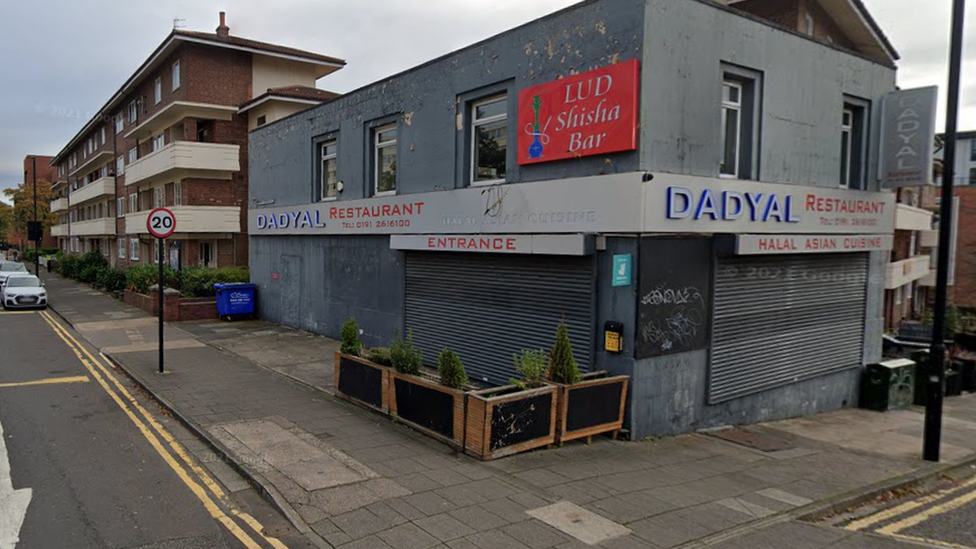James Atkinson inquest: Coroner to support ingredients law change
- Published

James Atkinson died from a peanut allergy after eating takeaway food in 2020
A coroner said she would support a law change that would force restaurants to publish food ingredients after a man died after eating a takeaway.
James Atkinson died from a peanut allergy in July 2020 after eating less than a slice of chicken tikka masala pizza from Newcastle restaurant Dadyal.
Mr Atkinson's parents called for more regulation to ensure that ingredients are highlighted on menus.
The assistant coroner Karen Dilks recorded a narrative conclusion.

James Atkinson's parents have called for more regulation in the food industry
Mrs Dilks said she would write to the Department of Health to urge GPs to regularly review patients who have allergies and educate them about the importance of carrying EpiPens.
She will also write to the relevant authorities in support of Owen's Law, which is calling for restaurants to state in writing the allergens their dishes include.
But she will not make any recommendations to the three major food ordering apps, which includes Deliveroo, about how they could mitigate the risks for any customers who may have an allergy.
She finished the hearing by offering her sincere condolences to Mr Atkinson's family who attended the inquest which started last Monday.
'Forever in our hearts'
Parents Jill and Stuart Atkinson called on the bosses of apps Deliveroo, UberEats and Just Eat in a statement to carry out a "collaborative review of what further steps can be taken to better protect consumers".
They added: "James will forever be in our hearts.
"Even if the outcome of this is that one person's life is saved, then that's something."
Mr Atkinson and two flatmates ordered three chicken tikka masala pizzas, chips and assorted Indian dishes on the Deliveroo app from the Dadyal restaurant in Newcastle, in July 2020.
Within an hour of eating a few mouthfuls of the pizza, which he did not know contained peanuts in a nut powder used to make the curry, Mr Atkinson had died in hospital.
The cause of death was anaphylaxis caused by eating peanuts in the curry, the inquest in Newcastle has heard.
Narrative conclusion
Coroner Karen Dilks returned a narrative conclusion at the end of the inquest at Newcastle Civic Centre, outlining how he ordered the food on an app, that he did not contact the restaurant directly to inform them of his allergies and that he did not have an EpiPen available once he started to feel ill.
She said the restaurant did not say on its menus that a mixed nut powder containing as much as 99% peanut was used in making its chicken tikka masala.
During the hearing, she heard that the Dadyal restaurant menus mentioned coconut, almond and cashew in the ingredients of their chicken tikka masala, but not the peanut powder it actually contained.
When Deliveroo users place an order they are warned to inform the restaurant directly if they had any allergies, the inquest has heard, but Mr Atkinson did not do that.

The inquest was told Dadyal restaurant has been shut for about two years
He knew he had a peanut allergy and was careful with what he ate, the coroner was told.
His flatmates said that night he used Google to check if tikka masalas contained nuts.
Gulfam Ulhaq, 58, who ran the restaurant for his brother who owned it, said it was up to customers to inform staff if they had an allergy.
'Am I going to die?'
Mr Atkinson told his friends that something was wrong with the pizza soon after his first mouthful as his lips began to tingle.
He was able to call for an ambulance while his two flatmates searched for his EpiPen, without success.
Paramedics were at his shared house in Jesmond within minutes and he asked the crew: "Am I going to die?"
He rapidly became very unwell and was rushed to the Royal Victoria Infirmary where efforts to save him were in vain.
'Make improvements'
The Dadyal in Howard Street has been closed for almost two years, the inquest was told.
James Cooper, Deputy Director of Policy at the Food Standards Agency said: "We have now written to Ministers in England and Wales and the Permanent Secretary in Northern Ireland and we have contacted counterparts at Food Standards Scotland to discuss the Board's position as the Board would like to see them take this forward on a four-country basis.
"Meanwhile, we will provide guidance and support to business so that we can quickly start to make improvements that will be helpful for people with food hypersensitivities when they are eating out."

Follow BBC North East on Facebook, external, X (formerly Twitter), , externaland Instagram, external. Send your story ideas to northeastandcumbria@bbc.co.uk, external.
Related topics
- Published12 January 2024

- Published11 January 2024

- Published10 January 2024
